Welcome to Screen Week! Join us as we explore the films and TV shows that kept us staring at screens. More from this series
10
Better Call Saul
Created by: Vince Gilligan & Peter Gould
[Netflix]

Having already turned a mild-mannered school teacher into Satan’s own drug lord, Vince Gilligan pulled a similar trick in Better Call Saul: he turned Bob Odenkirk into America’s best actor. Or near enough, anyway. As a sketch comedian, Odenkirk was the perfect vessel for Gilligan’s love of the hairpin narrative twist, even if the series itself suffered for that at times — where Breaking Bad started with the indelible image of the van in the desert, Better Call Saul defied expectations (as well as attention spans) by opening with a misfiring sub-plot about two identical twin skateboarders. But when the real story eventually came into view, it was presented with refreshing sincerity, as Saul tried to navigate a straight line between his brother’s influence and the cheerful life of a serial con artist. When he found it as the underdog in a fight against a care home scamming its seniors, the series built to one of the great scenes in this fictional universe, an extended nervous breakdown during a bingo game that rivals the work Gilligan and Odenkirk did on Breaking Bad. It’s not all good, man, but mostly it is, and occasionally it’s great.
09
Show Me a Hero
Created by: David Simon
[HBO]

David Simon’s most famous series, The Wire, adapted the 1920s silent film genre of the city symphony for a humanist, and televisual, scale, showing the interconnected dysfunction of Baltimore’s diverse institutions — both officially sanctioned and not. Simon’s unsensationalistic realism felt brave, albeit dissonant, when confronting mythic beasts like Baltimore’s crime and poverty; likewise for his subsequent series Treme, on post-Katrina New Orleans. His new miniseries, Show Me a Hero, on the other hand, approaches — with the same slow precision — a subject that hardly needs tempering: local electoral politics and public housing policy in late-1980s Yonkers. The result was, I’ll say it, Simon’s best work — and worst elevator pitch — to date, turning meticulous debates about urban planning — literally: high rise public housing or smaller apartment building public housing? — into some nail-biting shit. While the most David Simon-y of his creations, it didn’t hurt that each episode was directed by a newly-restrained Paul Haggis and featured a cast including not only 2015’s it-guy Oscar Isaac but also Catherine Keener, Winona Ryder, Carla Quevedo, Alfred Molina, and Jim Belushi. In an era of intricately constructed TV cliff hangers and increasingly sensual direction on the small screen, Show Me a Hero seemed almost old fashioned. Like longform investigative journalism or civil political debate. Put differently, it felt like something new.
08
Bojack Horseman
Created by: Raphael Bob-Waksberg
[Netflix]
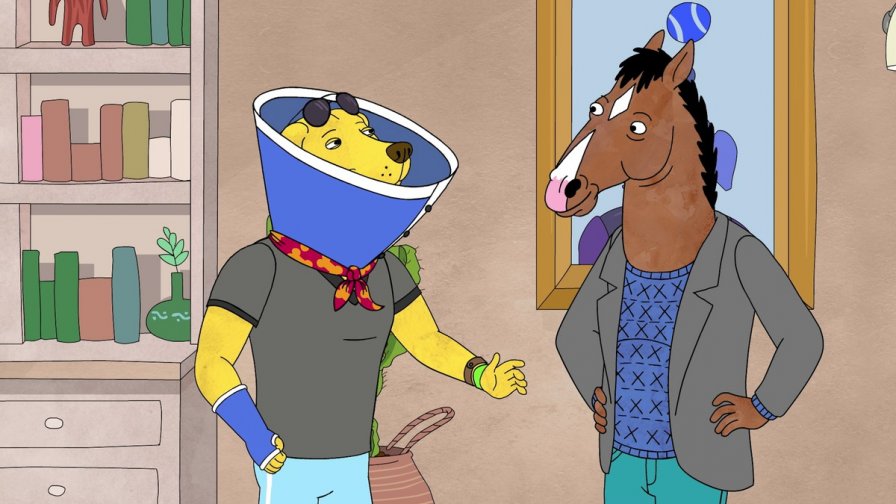
A horse walks into a bar. He stands in the crowded room, alone, thinking to himself: “What happened?” He recounts the efforts he made to better himself, after receiving the role of a… his… lifetime. He recalls his new love, now lost. Wanda: with a troubled past, but resourceful and stronger than him. He thinks of his dead friend and the lack, forever, of resolution. He wonders: “What’s left?” He thinks about his friends and their foibles. His friend, yes, his friend, and how he can get him to come home. “I love you?” Why did he say that, he wonders? “I love you…” He wonders how it came to happen that he could fuck up so badly, lose it all. He tried, he knows: to do better, find love, keep friends, make his fucking film. He flew, oh god, like an asshole out to New Mexico. “A boat? Fuck.” He stands alone. The voices in the bar begin to take on shape, so he walks up to the bar to order a drink, two, however many. The bartender looks at him, curiously, and asks, “Why the long face?”
07
Silicon Valley
Created by: Mike Judge, John Altschuler & Dave Krinsky
[HBO]
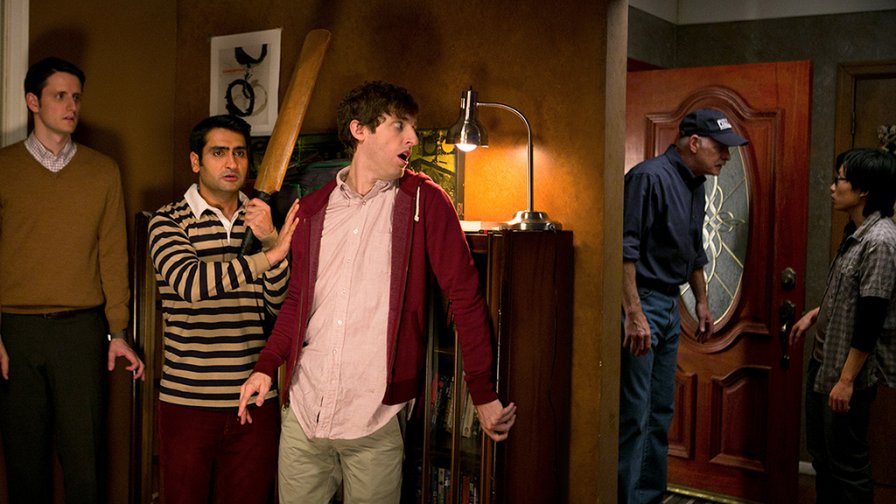
It’s reassuring that with the recent surge of television romanticizing computer culture and recasting the “hacker” archetype into that of the beautiful, tortured weirdo, we’re also seeing the other side of the coin courtesy of Mike Judge & co’s Silicon Valley. The tech world is exciting and high stakes, but like any large industry, it’s also a major clusterfuck in which the brilliant, the inept, the greedy, and the naive are all thrown together, spending way more time dealing with each other’s bullshit than doing any meaningful work. Where shows like Halt and Catch Fire and Mr. Robot seem to have a groundbreaking discovery or world event every episode, Silicon Valley follows just one product rollout, instead finding new ways to frustrate and bog it down week after week. Judge’s satire puts the harsh, annoying truths of the work world on display and shows us the cathartic humor in the absurdity of it all. As the modern portrait of the computer genius skews toward handsome and brooding, it’s nice to be reminded that it can also be some beleaguered schmuck like the rest of us.
06
Halt and Catch Fire
Created by: Christopher Cantwell & Christopher C. Rogers
[AMC]

Beyond the metaphysical significance of home computing, the intellectual properties of Apple, Google, Facebook, and Amazon are also united in the premise that business is spiritual — that happiness is the property of satisfied customers and the shareholders for whom they provide. Herein lay Halt and Catch Fire’s claim to relevance: against this tidy corporate image of commercialized humanism and progressive consumerism, Cantwell and Rogers juxtaposed a messier tale of organizational capital in motion, a story of egotism, betrayal, greed, and failure. If season one was about the reality distortion field and its vicissitudes, all 50 Shades Of Jobs and Fleek Wozniak, HCF’s sophomore go-around pulled the rug from under the feet of its male leads (allowing the crumpled, thwarted Toby Huss time to shine) and let Kerry Bishé and Mackenzie Davis lead the way. The improvement was both organic and undeniable. And yet, and yet… For a show that twists around the impossible relationship between labor and love, it should never have ended as it did. News of a third season is entirely welcome.
05
Game Of Thrones
Created by: David Benioff & D.B. Weiss
[HBO]
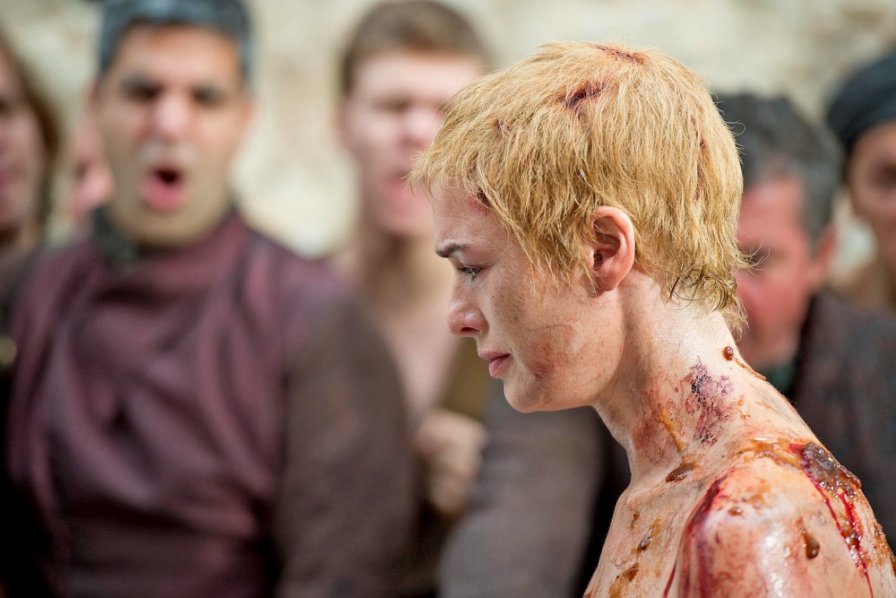
For the watch: a watch that stabs us repeatedly and purposefully, no matter our loyalty. For the spectacle: a creeping and unstoppable army of winter, a healing house of faceless assassins, three-headed fire-breathing dragons. For the performances: Emilia Clarke stirring the embers of Daenerys’ maddening maternal life, Stephen Dillane stealing an exhausted and embattled heroism from the irredeemably written Stannis, Lena Headey walking a fine line through Cersei’s goldcloaked daze. This past season of Game of Thrones might’ve been its most uneven and unfair on a storytelling and story level (the senseless exploitation of Sansa, the punchline plotting in Dorne, the wrong bastard’s Northern triumph). But we pledge our lives to this increasingly joyless show — was there much relief other than Jon and Sam’s friendship? Tyrion and Varys’ banter? — because the stakes and sights are finally matching the doomed heights of the body count, because we still hope against hope for Rhaegar’s poetry, Tolkienian justice, and a binding kind of magic. Or maybe we’re just obsessively blinded by vengeance like Arya. The wind is rising, and the dead too. You should be watching the long night gather with a thousand eyes and one, because TV’s never seen a song like this.
04
Rick and Morty
Created by: Justin Roiland & Dan Harmon
[Adult Swim]

Imagine a show where anything is possible, spanning infinite worlds where the crannies of spacetime knot and unfold into impossible realities, always alongside the inescapable shit of humanity. The second season of Rick and Morty, Adult Swim’s misadventures of an alcoholic super-genius scientist and his reliably below-average grandson (respectively), pushes the delightfully perverse imaginations of creators Justin Roiland and Dan Harmon through multiple dimensions and squeezes out not only reliably insightful and philosophically-ripe science-fiction narratives, but some remarkably tight takes on pop culture phenomena. Rick and Morty’s universe-jumping errands play out in parallel to the domestic mundanities of Morty’s nuclear family, back on Earth-suburbia, and the best bits of the show bring the family’s base insecurities and wants into focus in alien contexts — in a galactic version of the Eurovision song contest; in the boudoir of Rick’s ex-hive-mind girlfriend; in a planetary daycare center for infinite parallel versions of Morty’s sniveling father, Jerry. The show’s humor pits Rick’s existentialist rationale and unapologetic logic against Morty’s retarded 14-year-old morality, dusting the show with a tone both infuriatingly smart and sad. The second season, broadcasted in 2015, ends with a dystopic climax of self-sacrifice and violence that threatens not only Morty’s family, but also the order of the universe. With a host of alien characters voiced by an impressive guestlist — including Nathan Fielder, Werner Herzog, Christina Hendricks, and Patton Oswald, to name just a handful — and animated in a Simpsons-meets-Adventure Time style, Rick and Morty is a classic in its own spacetime.
03
The Knick
Created by: Jack Amiel & Michael Begler
[Cinemax]
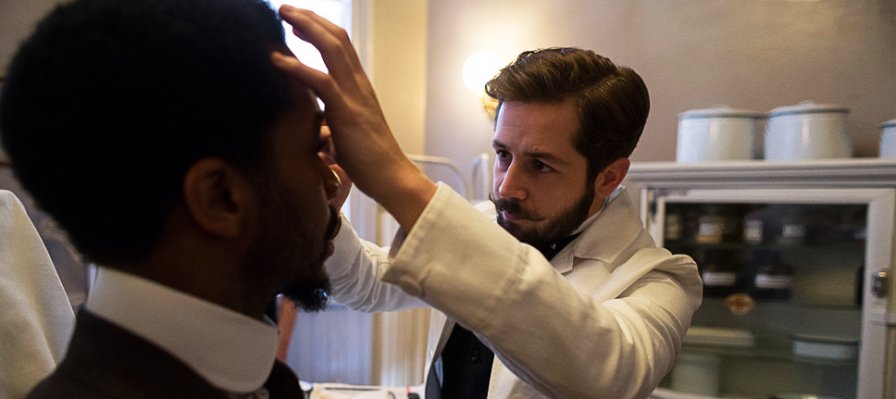
Having already firmly established the morality and regulations, or lack thereof, of The Knickbocker’s surgical rooms and administrative corridors in its fantastic first season, Steven Soderbergh’s gripping period drama busted those hospital doors wide open in its second season, extending its roots into every crevice of early 20th-century New York City society. When it wasn’t thrilling us with Thack’s increasingly reckless yet mostly successful surgical wizardry, The Knick tackled everything from women’s rights, immigration, and eugenics to religious zealotry, fraud, and race relations. Cliff Martinez’s pulsating, futuristic score and Soderbergh’s ever-inquisitive camera breathed energy and life into a genre often tedious and dry, creating a world that felt of-its-time yet accessibly modern. And it’s no wonder, as The Knick, despite being set over one century ago, shined a mirror that very delicately and subtly reflected our own times, as it quietly became one of the most socially and politically relevant shows on television.
02
Mad Men
Created by: Matthew Weiner
[AMC]

Speculation was rampant in the run-up to the final episode of Mad Men. Fans of the show scanned each frame for portents that Don Draper would suffer a total breakdown and become the “falling man” of the opening credits or that Megan Calvet would be hacked to pieces by a horde of Manson Family acolytes. These prophecies ultimately proved to be without merit, but their existence calls up an interesting question: what kind of show did these people think they were watching? Surely after six and a half seasons, nobody in their right mind could mistake Matthew Weiner for someone who would end his masterwork on a ham-fisted suicide or wholly implausible cult murder. But Mad Men was always a show that defied idle speculation or fanboyish recapping. It was the last of the small handful of truly ambitious shows that emerged in the wake of The Sopranos, television that was willing to turn an all-encompassing eye on Western society and the institutions that undergird it, and force upon viewers the knowledge that the whole thing is an utter fabrication, rotted hollow from its foundations.
01
Nathan for You
Created by: Nathan Fielder & Michael Koman
[Comedy Central]
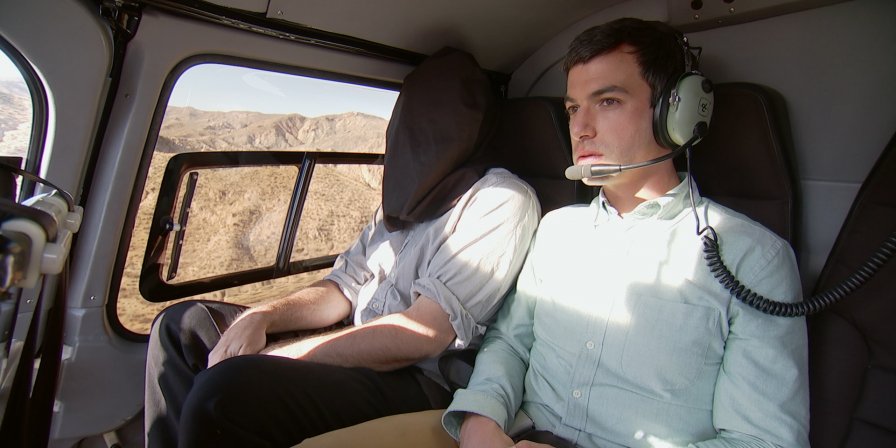
Nathan Fielder knows that TV changes lives. He’s like Ed McMahon with an oversized check at your door — except it’s not Ed McMahon, it’s a terrified nebbish with really good grades from one of the top business schools in Canada; and it’s not a check, it’s a paper bag filled with shit lit on fire; and it’s not a door, it’s your sense of consequence and continuity and trust and agency. An impressive accomplishment for a cable prank show whose first moments involved selling poo-flavored frozen yogurt. On Nathan For You, “reality television” loses any connotation of oxymoron, as Fielder packs the gap between the real world and the small screen with ample paratextual insulation. He’s made life as exciting as TV and vice versa, all mounting to the alarming snowclone: it’s Nathan’s world, we just live in it.
In its third season, the genre-defying (it is a “prank show” as much as Seinfeld was about nothing) phenomenon continues to unveil just how long and elaborate this con is. The simple conceit — Fielder offers struggling small businesses a harebrained makeover — has developed into seasons-spanning, news-making, life-changing commentary on and mobilization of the multi-platform, life-size situation comedy the world has become. It seems that Fielder has crafted his own self-contained universe until you remember that all its tiny moving parts are real people doing real-ish things. As the callbacks from its cast of they-can’t-be-real weirdos and surely-this-is-fake-who-am-I? pranks became more and more intricately tangled, it would be hard to believe that any of this was more than a big hoax if you weren’t already caught up as one of his eager dupes. His knack for going viral, Kardashian in scale, and Kauffman-esque in form drew attention to how easy it is to target a culture that’s primed to believe the hype.
But even as we buy into his ruse, Nathan For You makes known that the people it fooled were never really that as a noun. They are, like Fielder himself, ingenuous losers, looking for love and acceptance and sometimes getting strung along a bit to get there. Whatever shtick he may put on, Fielder is no doubt still an IRL big weird dog who needs a nice pat on the head when things get tough. Staging a slice-of-life play to sidestep a smoking ban in one of the season’s finest episodes, Fielder writes his own validation into the dialogue. Teary-eyed at the scripted praise, he notes “They say reality is what you make of it, so in a world that’s cruel and hurtful, who’s to say mine can’t be nice,” a quote so unnervingly on the $$$ that I have to assume it was written for its inevitable inclusion on EOTY lists.
For the baby signs lit up in our eyes, it can be easy to overlook the awe-inspiring humanity of Fielder’s stunts, which even at their cringiest note that you’re not an idiot for being made a sap. He never goads his marks into looking stupid; he merely lets the camera linger long enough to catch the candidness that we so rarely see in a time when Instagram filters are only the most literal of our endless means of self-mediating. The greatest trick Nathan For You pulled was convincing the world it was jerking our chain anymore than we do ourselves anytime we get something #trending. Yes, he wields an improbable amount of power for a cable TV host whose grades weren’t even that good, but he mostly uses it remind us of the not immodest dignity of being a dork.
More about: 2015
Welcome to Screen Week! Join us as we explore the films and TV shows that kept us staring at screens. More from this series



